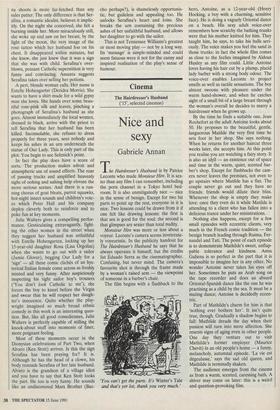Cinema
Nice and sexy
Gabriele Annan
The Hairdresser's Husband is by Patrice Leconte who made Monsieur Hire. It is sex- ier than any film I can remember, including the porn channel in a Tokyo hotel bed- room. It is also unmitigatedly nice — nice in the sense of benign. Except for two bit parts to point up the rest, everyone in it is nice. Two lessons could be drawn from it if one felt like drawing lessons: the first is that sex is good for the soul: the second is that glimpses are sexier than total nudity.
Monsieur Hire was more or less about a voyeur. Leconte's camera seems inveterate- ly voyeuristic. In the publicity handout for The Hairdresser's Husband he says that he always operates it himself, but the credits list Eduado Serra as the cinematographer. Confusing, but never mind. The camera's favourite shot is through the frame made by a woman's raised arm — the viewpoint of someone in a barber's chair.
The film begins with a flashback to the
'You can't get the parts. It's Winter's Tale and that's yer lot, thank you very much.'
hero, Antoine, as a 12-year-old (Henry Hocking, a boy with a charming, sensitive face). He is doing a vaguely Oriental dance on a beach. His sexy adult voice-over remembers how scratchy the bathing trunks were that his mother knitted for him. They taught him, he says, to take his balls seri- ously. The voice makes you feel the sand in those trunks: in fact the whole film comes as close to the feelies imagined by Aldous Huxley as any film could. Little Antoine loves having his hair cut by a plump, placid lady barber with a strong body odour. The voice-over enables Leconte to project smells as well as tactile sensations. The boy almost swoons with pleasure under the warm hand-shower, and when he catches sight of a small bit of a large breast through the woman's overall he decides to marry a hairdresser when he grows up.
By the time he finds a suitable one, Jean Rochefort as the adult Antoine looks about 50. He proposes to the beautiful, gentle, languorous Matilde the very first time he sets foot in her shop. She says nothing. When he returns for another haircut three weeks later, she accepts him. At this point you realise you are watching a fairy story. It is also an idyll — an existence out of space and time in the warm, quiet, scented bar- ber's shop. Except for flashbacks the cam- era never leaves the premises, not even to go upstairs where Matilde has a flat. The couple never go out and they have no friends: friends would dilute their bliss. Whenever the shop is empty they make love: once they even do it while Matilde is attending to a client who has fallen into a delicious trance under her ministrations.
Nothing else happens, except for a few small episodes with eccentric clients, very much in the French comic tradition — the benign branch leading through Raimu, Fer- nandel and Tati. The point of each episode is to demonstrate Mathilde's sweet, unflap- pable tolerance and kindness. Anna Galiena is so perfect in the part that it is impossible to imagine her in any other. No wonder Antoine never takes his eyes off her. Sometimes he puts an Arab song on the tape recorder and does an absurd Oriental-Spanish dance like the one he was practising as a child by the sea. It must be a mating dance; Antoine is decidedly eccen- tric.
Part of Mathilde's charm for him is that 'nothing ever bothers her'. It isn't quite true, though. Gradually a shadow begins to fall: Mathilde dreads the day when their passion will turn into mere affection. She resents signs of aging even in other people. One day they venture out to visit Mathilde's former employer (Maurice Chevit) in an old people's home — a funny, melancholy, autumnal episode. 'La vie est degeulasse,' says the sad old queen, and Mathilde is terminally shaken.
The audience emerges from the cinema as from a warm, scented, caressing bath. A shiver may come on later: this is a weird and question-provoking film.


















































 Previous page
Previous page